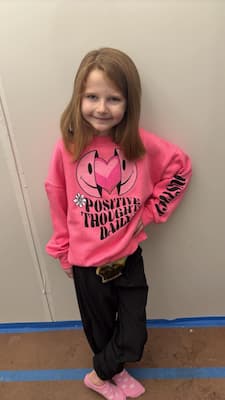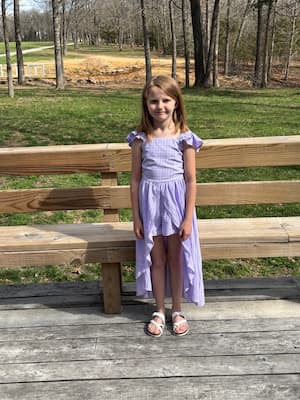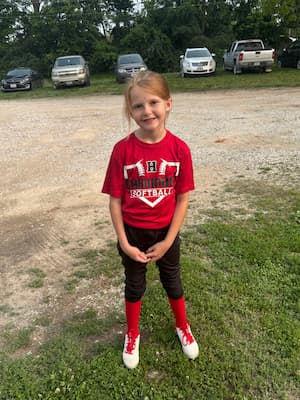Severe Constipation: McKinley’s Story
Meet McKinley

When 8-year-old McKinley isn’t playing traveling-team softball or cheering on her dad Dewayne at the racetrack, she’s got her nose in a Dogman book. This go-getter is always ready with a smile — one that’s considerably brighter after an ileostomy surgery at Children’s Mercy helped end years of stomach pain and chronic, severe constipation.
“She’s light,” said McKinley’s mom, McKayla. “And Children’s Mercy Kansas City brought light back to her.”
For her entire life, McKinley had struggled with constipation severe enough to require occasional hospital stays. But in May 2024, her symptoms got much worse. Her stomach hurt too much to eat. She was weak, losing weight and having trouble paying attention at school. McKinley and her parents, McKayla and Dewayne, battled through seven months with 18 different hospital stays, multiple team transfers, several surgeries, conflicting advice and no lasting solutions.
“We felt like we were in a canoe out in the middle of an ocean with one broken paddle that a shark ate two weeks ago,” said McKayla. By the winter, McKinley was down to 47 pounds and had missed six total weeks of school.
Finding solutions at Children’s Mercy

McKayla and Dewayne asked their pediatrician for referrals to a colorectal team that could help McKinley. “We were willing to take her anywhere,” said McKayla.
They didn’t have to go far or wait long: Within several days, the Springfield, Mo. family was at Children’s Mercy in Kansas City and meeting with surgeon Rebecca Rentea, MD, MS, MBA, FACS, FAAP, director of the Comprehensive Colorectal Center (CCC), and her team. Before they arrived, the CCC did a detailed study of McKinley’s medical history to understand her story.
“When I met McKinley, her family had followed all the directions of all the different specialists that they had seen, and she still wasn't feeling well,” said Dr. Rentea.
Dr. Rentea explained that constipation is extremely common in children, but also very hard to define. There are many different treatment strategies, and most focus on the short- or medium-term solutions most patients need.
It’s much less common for constipation to be severe enough to require surgery, like the Malone antegrade continence enema (MACE) procedure McKinley had gotten. It created a channel from her abdomen to the colon, so the enema solution can be delivered by a small catheter, making daily flushes easier. But McKinley was still ending up in the hospital with severe constipation. The team talked with McKinley and her family about their options.
“The second we got to our appointment, we could breathe a bit easier,” said McKayla, who especially appreciated how the team included McKinley in conversations about her health. “They treated my kid like she mattered,” said McKayla. “They also didn't forget that they were speaking to a 7-year-old — but a 7-year-old who could tell you exactly how to place an NG tube.”
After their initial consultation with the CCC team, McKinley stayed in the hospital for six days. During that time, her team worked to adjust McKinley’s medications and MACE tube size, which helped. They went home, but McKinley needed to be admitted to the hospital in Springfield again after only four days.
“That’s when we ended up saying: Let’s give the colon a break,” said Dr. Rentea. She talked to the family about an ileostomy, which creates a surgical opening (a stoma) in the abdominal wall to empty waste from the small intestine (ileum) into a small bag.
“An ileostomy lets out stool all the time,” said Dr. Rentea. “It was created to avoid having to deal with the colon, which is what was giving McKinley problems.”
An ileostomy would allow McKinley to return to an active, healthy life, if with a different digestive system than most of her peers. McKinley and her family decided to get the surgery.
Dr. Rentea commended how dedicated McKinley’s family was and how well they understood what they wanted her quality of life to be like. “They really knew what the end goal was,” said Dr. Rentea.
A life-changing procedure

McKinley had surgery on January 2. She was ready for her life to change. She woke up from anesthesia faster than anyone expected, asking to go on a walk. She cried when she saw the ileostomy bag for the first time, but within a couple hours, she was asking her grandparents if they wanted to see it, too. That night, she was walking and eating, and by the next morning, she was off IV medication. She was on the floor playing with Legos when Dr. Rentea came in to check on her and was excited to go home.
Since January, McKinley has only been back to the hospital once to fix a dislodged tube — a far cry from 2024’s constant hospital travel. The family is happy to be back in Springfield and all together instead of constantly split up by medical trips.
“It was a life-changing procedure,” said McKayla. “McKinley has to do things differently, but it doesn’t hold my kid back at all.”
The family took a wish trip to Disney World in April, thanks to Dream Factory of Southwest Missouri. McKinley was able to thoroughly enjoy the vacation. “She was up at daylight and partying until after 10 p.m.,” said McKayla. The family has been working on ways to help other kids through their medical journeys, too.
McKinley has been playing competitive softball and is very involved in her own bag care. “She’ll say, ‘Hey, Mom, don’t forget the O-ring,’ or ‘Make sure you squeeze it at the bottom,’” said McKayla. She loves how McKinley is taking back control over her life and body.
McKinley calls her stoma Rosy or Floppy, depending on its shape that day. She explains her ileostomy bag to other kids by telling them that her body doesn’t work like everyone else’s, and the bag helps her feel better. She talks to other kids about their hospital experiences and says her life changed when she got to Kansas City.
“She didn’t have to accept it, but she chose to,” said McKayla. “She chooses every day to be happy. She’s happy to be feeling better, she’s healthy, and she’s living life the way she wants to.”
A place to grow

McKinley will continue to work with her Children’s Mercy team as she grows. They’ll meet with the Pediatric Motility program in August and check back in with Dr. Rentea in September. In the meantime, they stay in touch through the patient portal. Reversing the ileostomy is an option in the future, but they aren’t rushing into any big changes.
“The colorectal team is out-of-this-world amazing,” said McKayla. “Anytime I have a question about care, they get ahold of me right away. It’s cohesive care.”
“The journey is not over, but we've really reached a great place,” said Dr. Rentea. “We’ve been able to create a better quality of life for her.”
McKayla has advice for other families struggling to find answers for their kids: Follow your gut and lean on your community. “If you need a second opinion, don’t hesitate,” she said. “Find your people and don’t give up.” McKinley’s family was especially grateful for support from the racing community; McKinley’s school nurse, Nurse Molly; and an online group for Children’s Mercy colorectal families.
“McKinley is just one of the happiest, most joyful and engaged kids,” said Dr. Rentea, who also praised her family’s ability to communicate and advocate for McKinley. “She brings out the best in our team.”
“Dr. Rentea hands down gave my kid her life back,” said McKayla. “Our family owes everything to the Comprehensive Colorectal Center.”